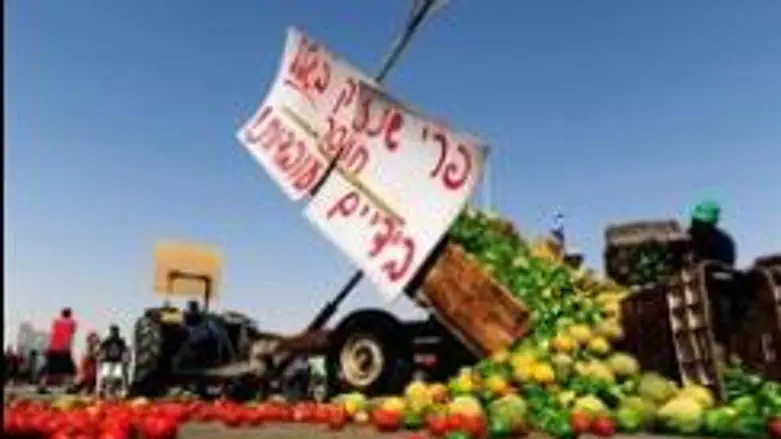
Hundreds of Israeli farmers continued to protest Monday against what they say is a serious shortage of foreign workers. Farmers insisted that allowing hundreds of foreign workers to enter Israel for the harvest would increase the number of jobs available for Israeli citizens.
The demonstration took place along the Arava highway in southern Israel.
The protesting farmers said that they needed another 600 foreign workers in order to complete the pepper harvest, which is to begin in the near future. If the Finance and Agriculture ministries do not step in to provide assistance, vegetables could rot in the fields, they said.
Agricultural Committee chairman Chaim Hevlin rejected arguments that foreign workers take jobs from Israelis. Workers who come from Thailand to harvest produce in Israel actually create jobs, he argued, by increasing agricultural output and thus upping the demand for goods and services such as boxes for storing vegetables, fertilizer, and vegetable transport.
Hevlin accused the government of neglecting the Arava region, despite promises from various ministries to work on behalf of Jewish settlement in the area. If the government does not fulfill its promises by assisting local farmers, protests will continue, he warned.
Police are currently engaged in a large-scale operation to reduce the number of illegal foreign workers in Israel.
Fruit Farmers Push Gaza Sales
Disruptions in the sale of Israeli fruit to Gaza caused farmers to lose 100 million shekels in 2009, Fruit Growers' Association head Ilan Eshel said Monday. Farmers were often unable to export fruit to Gaza for security reasons.
The lost sales to Gaza hurt fruit growers in two ways, Eshel said: first of all, by causing them to lose a market that would have produced an estimated 100 million shekels in profit, and secondly, by flooding the Israeli market with fruit, causing prices to drop.
Farmers accept that Gaza crossings are often closed for reasons related to national defense, Eshel said. However, he said, Israeli officials must simplify the export process when crossings are open, instead of using a complicated bureaucratic process that makes export difficult. As an example, he reported that farmers were not allowed to export kiwi fruit to Gaza this year.